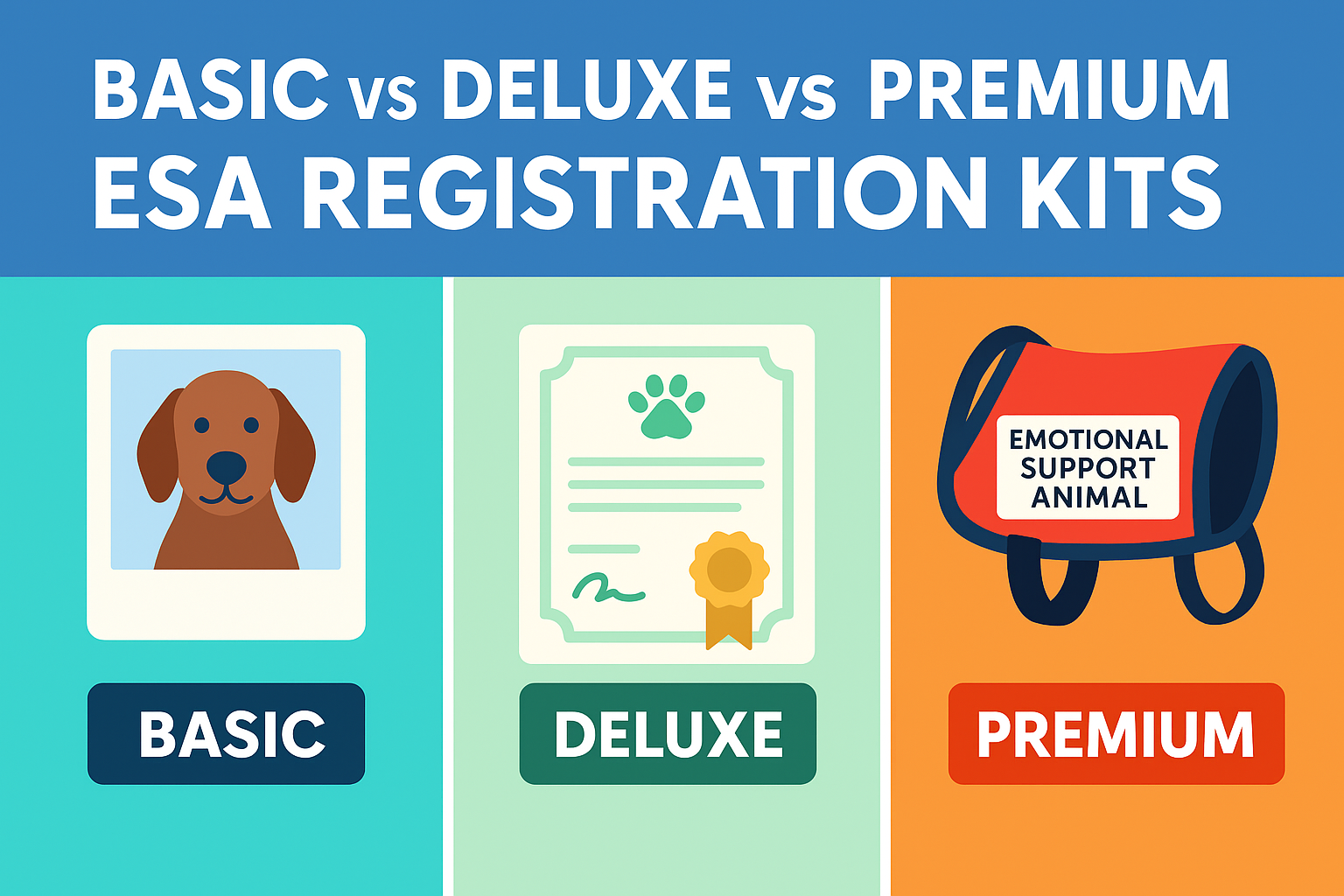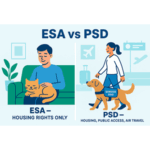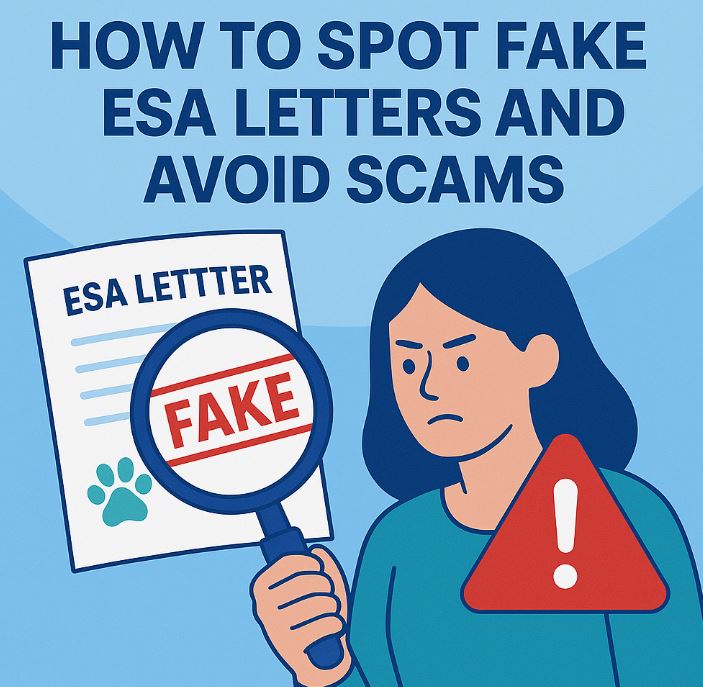When Landlords Can Legally Deny an ESA Request
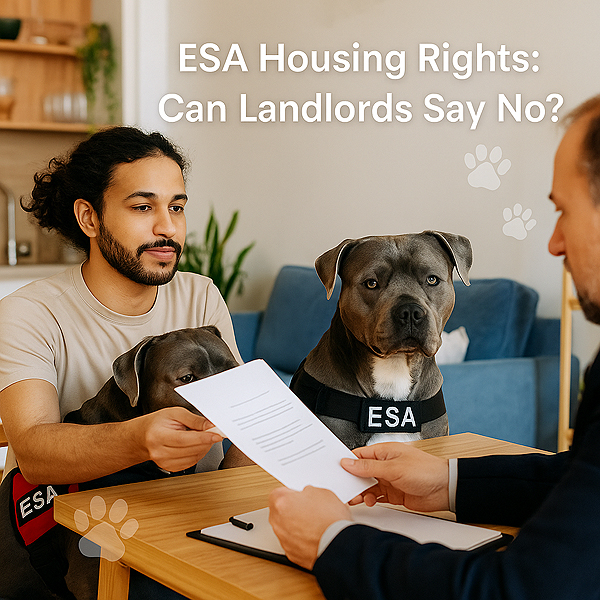
Introduction
Most ESA owners know that the Fair Housing Act (FHA) protects their right to live with an Emotional Support Animal (ESA), even in “no pet” housing. But here’s what many don’t realize: landlords do have limited legal grounds to deny an ESA request.
If you don’t understand those exceptions, you may be caught off guard — and risk losing your housing or getting into unnecessary disputes.
The good news? Most denials are not legal, and knowing the difference gives you the power to push back.
👉 In this guide, we’ll break down the valid reasons landlords can deny an ESA, the common (but illegal) excuses they try to use, and what to do if your ESA request is wrongly rejected.
🔗 Jump to a Section:
- Your ESA Rights Under the FHA
- When Landlords Can Deny an ESA Request (Legal Grounds)
- Illegal Reasons Landlords Cannot Deny an ESA
- How to Respond to a Denial
- Case Examples of ESA Denials
- FAQs About ESA Denials
- The Bottom Line
Your ESA Rights Under the FHA
The Fair Housing Act (FHA) is a federal law that requires housing providers to make reasonable accommodations for individuals with disabilities. For ESA owners, this means:
- ✅ You can live with your ESA, even in “no pets” housing.
- ✅ Landlords cannot charge pet deposits or pet rent.
- ✅ Breed and size restrictions do not apply.
- ✅ Applies to most housing types, including apartments, condos, co-ops, and college dorms.
But “reasonable” does not mean “absolute.” The FHA allows landlords to deny requests in certain situations.
When Landlords Can Deny an ESA Request (Legal Grounds)
There are only a few valid reasons a landlord can reject an ESA request:
1. The ESA Poses a Direct Threat
If the animal has a history of aggression or has caused serious harm, a landlord may deny the request. Example: a dog that has bitten other tenants.
2. The ESA Would Cause Significant Property Damage
If an ESA is likely to cause substantial physical damage beyond normal wear-and-tear, a landlord can refuse. Example: a large animal in fragile historic housing with documented past issues.
3. The Tenant Fails to Provide a Valid ESA Letter
Without a current letter from a licensed provider, a landlord has no obligation to accommodate. Letters must be renewed annually.
4. The ESA Request Creates an Undue Burden
In rare cases (e.g., very small housing providers), accommodating an ESA may be considered an undue financial or administrative burden.
5. Fraudulent ESA Documentation
If the letter comes from an unlicensed provider, is a “lifetime ESA letter,” or is clearly fake, a landlord may legally deny.
Illegal Reasons Landlords Cannot Deny an ESA
Unfortunately, many landlords misuse the law or deny requests for reasons that aren’t legal. Here’s what they cannot do:
- ❌ “No pets allowed.” → FHA overrides pet bans.
- ❌ “That breed isn’t allowed here.” → Breed/weight restrictions don’t apply to ESAs.
- ❌ “We don’t accept ESAs in luxury apartments.” → FHA applies to all covered housing.
- ❌ “We’ll allow it, but you must pay a deposit.” → Pet deposits/fees are illegal.
- ❌ “You need to register your ESA by law.” → No registration law exists. Only a valid letter is required (though NSAR kits help smooth interactions).
How to Respond to a Denial
If your landlord denies your ESA request, here’s what to do:
- Stay Calm and Professional
→ Respond in writing, citing the FHA. - Clarify the Law
→ Example: “Under the Fair Housing Act, breed restrictions do not apply to ESAs. Attached is my ESA letter from a licensed professional.” - Provide Verification
→ Offer for the landlord to verify your provider’s license. - Escalate if Necessary
- Contact HUD or your local fair housing office.
- File a complaint online with HUD (fast and free).
👉 Pro Tip: Always communicate in writing and keep copies — documentation strengthens your case.
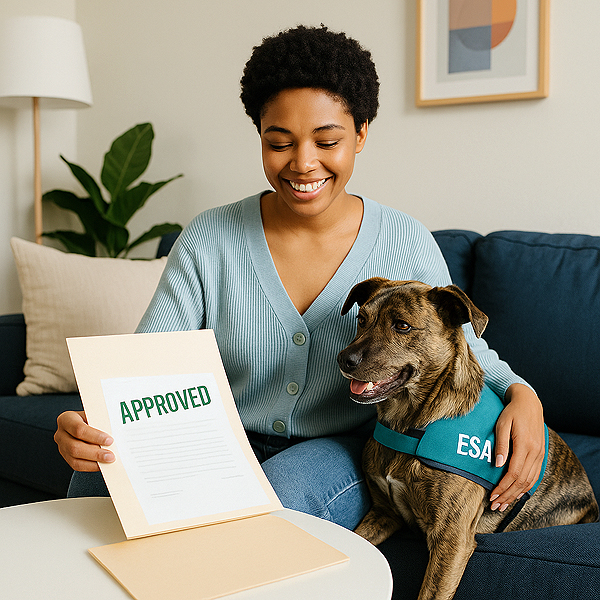
Case Examples of ESA Denials
Case 1: Breed Restriction Denial
Carlos’s landlord tried to deny his ESA pit bull. He provided his ESA letter and cited FHA law. The denial was overturned.
Case 2: Fake ESA Letter
Emily bought a “lifetime ESA letter” online. Her landlord rejected it — and legally, the denial stood. She later obtained a valid letter from NSAR and was approved.
Case 3: Aggressive Animal
A tenant’s ESA had bitten two neighbors. The landlord legally denied the request because the dog posed a direct threat.
FAQs About ESA Denials
Can my landlord deny my ESA because of insurance restrictions?
No. Insurance concerns don’t override FHA protections.
What if my ESA is large?
Size doesn’t matter — landlords cannot deny based on weight or breed.
Can I be evicted for having an ESA?
Not if you have a valid ESA letter. If you don’t, landlords may treat the animal as a pet.
Do ESAs have public access rights?
No. FHA protections only cover housing. Public access applies only to service dogs under the ADA.
The Bottom Line
Under the Fair Housing Act, your landlord must accept your ESA — but there are a few legal exceptions.
Landlords can deny requests if:
- The ESA is dangerous
- The ESA would cause significant damage
- You don’t have a valid ESA letter
- The request creates an undue burden
They cannot deny based on breed, size, “no pets” rules, or deposits.
👉 Protect yourself with a legitimate ESA letter from NSAR — written by licensed providers and trusted by landlords nationwide.
✨ Start your evaluation today and secure your housing rights with confidence.



